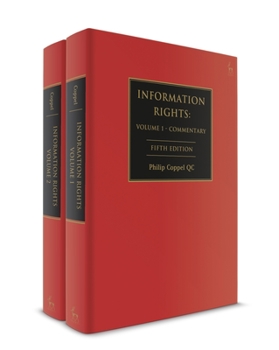Information Rights: A Practitioner's Guide to Data Protection, Freedom of Information and Other Information Rights
Retaining the position it has held since first publication, the fifth edition of this leading practitioner text on information law has been thoroughly re-worked to provide comprehensive coverage of the Data Protection Act 2018 and the GDPR.
Information Rights has been cited by the Supreme Court, Court of Appeal and others, and is used by practitioners, judges and all those who practise in the field. The new edition maintains its style of succinct statements of principle, supported by case law, legislative provisions and statutory guidance. Reflecting its enlarged scope and to maintain easy referencing, the work has been arranged into two volumes. The first volume is a 1,250-page commentary, divided into six parts. The first part is an overview and introduction to overarching principles. The second part provides an authoritative treatment of the data protection regime. This covers all four forms of processing (general, applied, law enforcement and security services) under the GDPR and DPA 2018. Each obligation and each right is comprehensively treated, with reference to all known case-law, both domestic and EU, including those dealing with analogous provisions in the previous data protection regime. The third part provides a detailed treatment of the environmental information regime. This recognises the treaty provenance of the regime and its distinct requirements. The fourth part continues to provide the most thorough analysis available of the Freedom of Information Act and its Scottish counterpart. As with earlier editions, every tribunal and court decision has been reviewed and, where required, referenced. The fifth part considers other sources of information rights, including common law rights, local government rights and subject-specific statutory information access regimes (eg health records, court records, audit information etc). The final part deals with practice and procedure, examining appeal and regulatory processes, criminal sanctions and so forth. The second volume comprises extensive annotated statutory material, including the DPA 2018, the GDPR, FOIA, subordinate legislation, international conventions and statutory guidance. The law is stated as at 1st February 2020.Format:Hardcover
Language:English
ISBN:1509922245
ISBN13:9781509922246
Release Date:May 2019
Publisher:Hart Publishing
Related Subjects
LawCustomer Reviews
0 rating





